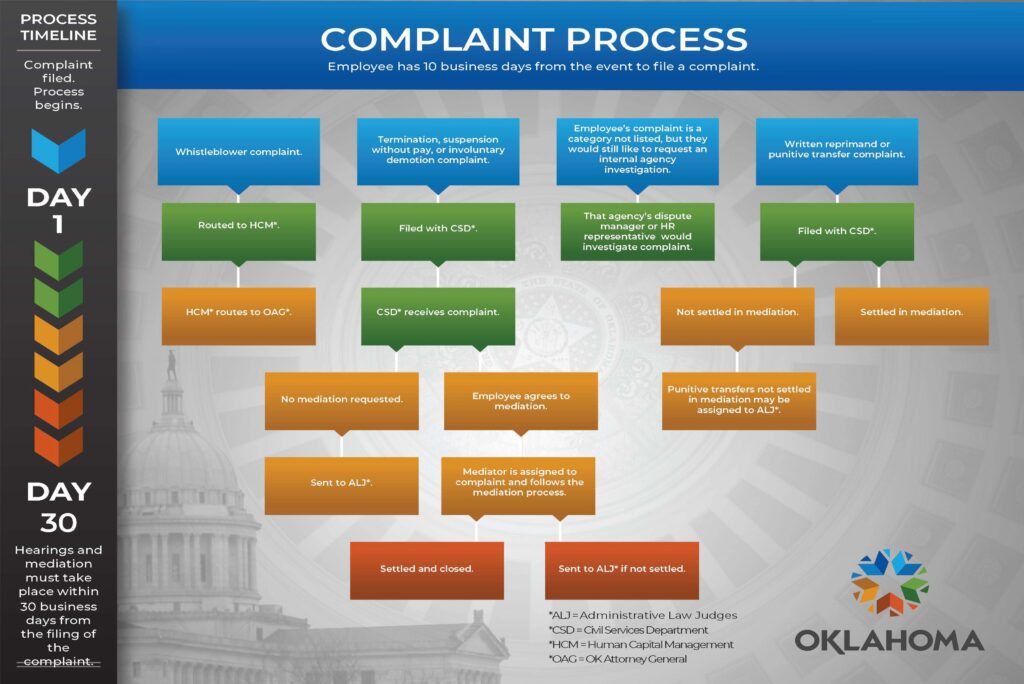State Employee Grievance/Complaint Check List
IMPORTANT: Consult with OPEA/Verify your OPEA Membership (Within 5 days of being notified of the adverse action).
Contact your membership representative or call our OKC office at 405-524-6764. OPEA can only represent members who have been dues-paying for at least six months prior to filing the complaint! Our grievance/complaint specialist and labor lawyers will set you up for success. We will help you determine whether to file with your agency’s internal complaint process, Human Capital Management’s Civil Service Division, whistleblower, or in rare cases file with the district court. Then we create a plan so you know what to expect for each step in the process.
*OPEA does have the right to not represent members.
Regardless of what you are grieving/complaining gather documents to support your claim. We will help you determine what to document based on your circumstances during your pre-grievance/complaint consultation.
We can talk you through every question, but you must fill out the form. You must file your complaint within 5 days of being notified of the adverse action you are disputing. We cannot fill it out for you! Make sure you list OPEA as your representation for your grievance/complaint. if you don’t we legally cannot represent you!
Once you have filed a grievance/complaint keep in contact with us with any updates. Continue to document every communication regarding the grievance/complaint until the case has concluded.
Don’t go around the office telling everyone about your grievance/complaint while your case is still being heard/mediated. You may have to sign a nondisclosure agreement to get your desired outcome. However, once the case has concluded you can speak freely about the process unless the agreement stipulates otherwise.
What is the Difference Between a Grievance and a Complant?
Internal Agency Complaint/Grievance
Each state agency has an independent internal grievance process. Each of these agencies has slight variations in process, but we will help members navigate through each of them. This process is often a mediation with your agency’s HR staff. This process is recommended for lower-level disputes such as leave disputes, issues regarding shared workspaces, etc. OPEA helps members with these grievances daily and we will be in your corner throughout the process.
Civil Service Division Complaint
he Human Capital Management Civil Service Division Comapaint is where state employees can submit issues to be reviewed by people outside of their agency. This process is used for highest-level complaints such as Terminations, Suspensions, Demotions, and Punitive Transfers. In addition to situations where the employee cannot get a fair mediation in the internal agency grievance process, the employee is unsatisfied with the internal agency grievance mediation outcome, or whistleblower complaints. This process is outlined below in the flowchart. Complaints can be heard by an independent mediator and/or an administrative law judge. Members will have OPEA legal staff right alongside them throughout this 30-day process.

Who can submit a grievance/complaint?
95% of Oklahoma State Employees are eligible to submit a grievance/complaint to either their agency or HCM’s Civil Service Division. The 5% unable to file a grievance/complaint are each agency’s “Executive Staff”. The top 5% of each agency leadership.
Submit a Grievance
This button takes you to the Civil Service Division home page. Here you can find State statutes, Rules, Policies, Flowcharts, Frequently Asked Questions, etc.

OPEA's Legal Advocacy Committee
When OPEA represents members most complaints/grievance cases come to a fair conclusion. However, in cases where either the member or OPEA staff feel the conclusion was flawed. OPEA’s Board of directors has established our legal advocacy committee to determine what cases to spend additional legal resources to continue. This committee consists of 5 appointed OPEA members who hear requests to review cases with outcomes that were not satisfactory to either OPEA or the member being represented. They then vote to determine whether or not to continue a complaint case.
